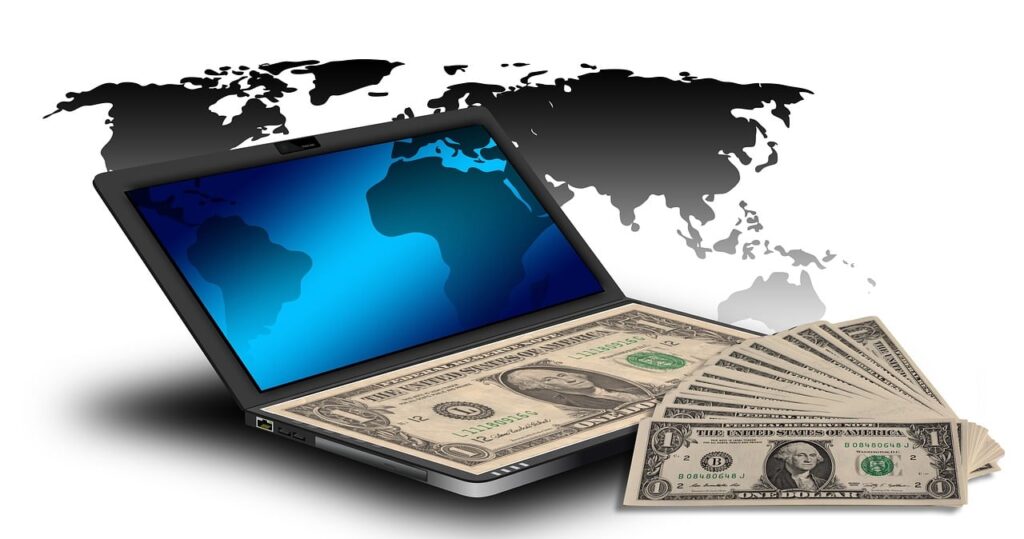Introduction to Fintech in USA
Financial technology, or fintech in USA, is a sector that is rapidly expanding and changing the financial environment in the United States. It entails utilizing technology in novel ways to deliver financial services that are more effective, available, and approachable. This Blog will explore a variety of Fintech-related topics in the USA.
Including its definition, kinds, regulations, jobs, advantages, and impacts. The capacity of fintech to increase consumer comfort and inclusiveness is a contributing factor in its fast growth. Its businesses provide a wide range of services. Including mobile banking, online lending, and digital payments, by utilizing digital platforms.
In addition to providing benefits like speedier transactions, enhanced financial inclusion, and increased competition. This industry has also generated new employment possibilities. It is ultimately revolutionizing delivery.
What is Fintech?
The term “fintech,” stands for “financial technology”. It refers to a wide range of technical developments and advances that are revolutionizing the Financial industry. This innovative sector uses cutting-edge tools. Like big data analytics, blockchain, artificial intelligence, and mobile applications to improve and modernize financial services. Its main objectives are to increase productivity, and streamline procedures.
They reduce costs and eventually give clients a better and more seamless experience. It has provided fresh and creative solutions in fields. Including peer-to-peer lending, mobile payments, digital banking, and robo-advisory services by integrating this cutting-edge technology. It is altering conventional financial practices by using technology and paving the path. For a more open, inclusive, and technologically advanced financial environment.
Types of Fintech in USA
Each industry and subsector of Fintech focuses on a certain aspect of Financial Services. Digital Banking, peer-to-peer lending, robo-advisory services, mobile payments, Blockchain technology, insurtech, and regtech. These are some of the more well-known categories in Fintech in USA.
> Wallets for mobile payments
Payment systems and mobile wallets have completely changed how transactions are carried out by providing customers. With safe and practical payment options via their cell phones. Businesses like PayPal, Venmo, and Square have contributed significantly to this change. Users may link their bank accounts and credit cards.
OR other payment sources with payment wallets to complete transactions quickly. Users may securely save their payment information on these platforms’ digital wallets, doing away with the need to carry actual cards or cash. Due to its simplicity, expedited transaction times, and improved security features.
Like encryption and two-factor verification, payment and mobile wallets have become more and more popular. This development in fintech has permitted the growth of e-commerce, and peer-to-peer transfers over the internet. They contactless payments in addition to simplifying payments.
> Crowdfunding and Online Lending
Traditional banking institutions have been challenged by the emergence of online lending and crowdfunding companies like LendingClub and Kickstarter. Direct contact between borrowers and lenders/investors is made possible by these platforms. By completing their loan requests online, borrowers may swiftly and easily acquire loans through online lending companies. The platforms offer loans financed by private investors and use cutting-edge algorithms to evaluate the creditworthiness of borrowers.
In comparison to conventional lending institutions. This strategy gives borrowers greater freedom and could provide cheaper interest rates. On the other side, crowdfunding platforms allow people and companies to generate money for their projects. OR initiatives by requesting modest donations from many people. The democratization of funding has opened doors for businesspeople and innovators who may otherwise find it difficult to
> Robo-Advisors
Robo-advisors, exemplified by platforms like Betterment and Wealthfront. They have revolutionized wealth management by utilizing algorithms and artificial intelligence. These digital platforms provide automated and personalized investment advice It’s making financial planning more accessible and cost-effective for individuals. Robo-advisors streamline the investment process by analyzing user data and risk preferences to create diversified investment portfolios tailored to each client’s goals.
They offer features like automated rebalancing, tax-loss harvesting, and low-cost index fund options. By eliminating the need for traditional human advisors. The robo-advisors provide a more efficient and affordable solution for individuals looking to grow their wealth. These platforms have gained popularity for their simplicity, transparency, and accessibility.
It’s allowing users to easily manage and monitor their investments through user-friendly interfaces. Robo-advisors have democratized wealth management, providing individuals with the tools and guidance to achieve their financial goals.
> Digital Banking
Digital banking has transformed the banking landscape with online platforms such as Chime and Ally Bank. These platforms provide user-friendly interfaces, round-the-clock access, and advanced Financial management tools. It’s offering a more accessible and efficient Banking experience.
Digital banking eliminates the need for physical branches and enables customers to conduct various banking activities remotely. Users can perform tasks like checking account balances, transferring funds, paying bills, and even applying for loans. These are all from the convenience of their devices. The 24/7 availability of digital banking platforms ensures. Customers can access their accounts and manage their finances at any time.
Additionally, these platforms often provide budgeting tools, expense tracking, and real-time notifications. It’s empowering individuals to have better control over their financial lives. Digital banking has brought convenience, flexibility, and enhanced financial management capabilities to customers. It’s driving the shift towards a more digital and customer-centric banking experience.
> Insurtech
The term “insurtech” refers to the use of technology in the insurance sector to improve workflow. They reduce red tape and provide specialized and reasonably priced insurance solutions. Eminent instances of insurtech businesses that have upended the conventional insurance paradigm are Lemonade and Oscar. To offer a smooth insurance experience, these businesses make use of cutting-edge technology. Like artificial intelligence, big data analytics, and digital platforms.
Customers may quickly buy insurance, submit claims, and maintain their coverage. With the use of insurtech platforms’ user-friendly mobile apps and intuitive user interfaces. Insurtech firms may more correctly assess risk and provide customized insurance products at competitive pricing by using data analytics. Peer-to-peer insurance and usage-based insurance are two further cutting-edge ideas. That insurtech has offered, giving clients more flexible and individualized coverage alternatives.
Fintech Startups USA
The IT finance industry, sometimes known as the convergence of technology and finance, is led by firms for the fintech in USA. Innovative technologies are used by these firms to alter and challenge established financial services. They are advancing technologies like blockchain, robo-advisory, online lending, mobile payments, and more by placing a heavy emphasis on innovation. The USA’s thriving startup scene offers a favorable environment for these businesses to grow.
The luring investment and encouraging cooperation with reputable financial institutions. American fintech firms are revolutionizing how people and businesses handle their finances by providing simple, straightforward solutions. By fostering financial inclusion and providing services to underserved populations. They are also addressing gaps in financial services. As the IT finance environment develops, these
Ms in Fintech USA

An MS in Fintech in USA refers to a Master of Science degree program focused on financial technology. It is designed to equip students with the knowledge and skills necessary to excel in the rapidly growing field of it. This specialized program combines elements of finance, technology, data analytics, and entrepreneurship to prepare students for careers at the intersection of finance and technology.
Students in an MS in Fintech program in the USA can expect to study topics such as blockchain technology, machine learning, digital payments, cybersecurity, regulatory compliance, and financial analytics. By way of internships or capstone projects, the program often provides a good mix of theoretical knowledge and practical experience.
Students who complete an MS in the program Fintech in USA are well-positioned to pursue a variety of careers in its startups. The financial institutions, and consulting companies, or even create their own fintech businesses. It’s helping to further the continuing transformation of the financial industry.
Top Fintech Companies USA
The fintech in USA is thriving, with leading businesses promoting innovation in the financial technology industry. Stripe, a well-known company, offers easy online payment processing solutions for businesses. Robinhood, a commission-free investment platform, has gained popularity among retail investors. Square enables small companies to accept credit card payments through their mobile payment solutions. SoFi stands out by providing a wide range of financial services.
Including student loan refinancing, personal loans, and investment opportunities. Coinbase is a top cryptocurrency exchange, simplifying the Buying, trading, and storing of various digital assets. Plaid offers a framework for seamless financial data integration, ensuring secure and convenient interactions across financial apps. These fintech firms in USA contribute to the dynamic and innovative landscape of the financial technology industry.
Rules and the Regulatory Framework/Fintech in USA
Regulating organizations have created guidelines to protect consumers, maintain financial stability, and advance ethical business practices in response to the explosive growth of fintech in USA. Its companies in the US are overseen by a number of government organizations.
Including the Securities and Exchange Commission [SEC], Consumer Financial Protection Bureau [CFPB], and Office of the Comptroller of the Currency [OCC]. By promoting innovation and guaranteeing regulatory oversight, these regulatory frameworks help to achieve a delicate balance.
The CFPB concentrates on protecting consumer financial interests, the SEC regulates the securities sector to safeguard investors. The OCC keeps an eye on the stability of the banking system. In the fast-developing fintech industry, these regulatory measures are essential. For upholding confidence, avoiding fraudulent activity, and encouraging responsible expansion.
Fintech careers/Fintech in USA
There are many professional prospects now thanks to the growth of fintech in USA. Its analyst, blockchain developer, data scientist, UX/UI designer, and compliance officer are among the positions. These are in high demand in the Fintech sector. Financial, technological, data-analytical, and user-experience professionals are in great demand.
> Data Scientists
Data scientists are essential members of the fintech in USA. They use their knowledge to detect trends in massive amounts of financial data. They analyze, construct algorithms, and offer insightful information for making well-informed decisions.
Professionals with excellent data science abilities are in great demand. Since their sector is relying more and more on data-driven tactics to drive innovation. These methods may be used by Fintech organizations to better understand their Customers’ needs.
> Software Engineers
Software developers, specifically fintech app developers, are crucial to the fintech in USA. They are responsible for creating innovative software and tools that drive finance platforms. Leveraging their expertise in programming languages, algorithms, and software development techniques, these experts design robust and scalable solutions.
As Fintech continues to Evolve and grow, the demand for skilled app developers remains high in the USA. Their contributions are instrumental in enabling cutting-edge Financial technology, improving user experiences, and ensuring the security and reliability of its systems.
> Cybersecurity Experts
Experts in cybersecurity are essential to the fintech in USA. The need for these specialists has grown dramatically as financial institutions rapidly digitize in order to protect sensitive financial data. Its businesses depend on cybersecurity professionals to create strong security measures. They put encryption methods into place, and proactively identify and address possible risks.
These professionals have a thorough awareness of risk management techniques, new risks, and cybersecurity frameworks in the fintech industry. Their knowledge is crucial for preserving client trust, regulatory compliance, and the confidentiality, integrity, and availability of data in their industry.
> Product Managers
In the fintech in USA, product managers hold a vital position. They are responsible for the design and management of its products. It’s collaborating closely with cross-functional teams to ensure the development and delivery of user-centric solutions. Their product managers possess a deep understanding of both the financial industry and the technology landscape.
They gather market insights, define product strategies, and oversee the entire product development lifecycle. By aligning customer needs with business goals, their product managers contribute to the creation of innovative and competitive fintech offerings. Their role is essential in driving user satisfaction, enhancing financial experiences, and maintaining the growth and success of fintech in USA.
> Compliance Specialists
Compliance experts are essential in the fintech in USA. They are in charge of ensuring that fintech businesses follow industry standards and legal obligations in order to reduce danger to their reputation and legal standing. Their compliance experts keep up with the changing regulatory environment, evaluate how rules affect business operations, and create and manage compliance programs.
Their knowledge helps their businesses in navigating intricate compliance frameworks, fill in compliance gaps, and uphold credibility with clients and regulatory bodies. Their compliance professionals support the ethical conduct and sustained growth of fintech in USA by respecting regulatory requirements.
Advantages of Fintech in USA
For both consumers and companies, fintech in USA has several advantages. Significant Benefits include simplified Financial services, greater convenience, better access to finance, effective payment systems, and expanded financial inclusion.

> Access to Information
Access to financial services has considerably grown thanks to fintech in USA. It has democratized financial services via the use of technology, opening them out to previously underserved people and rural regions. Individuals and organizations may effortlessly access financial goods and services. Like banking, loans, and investments, without the restrictions of physical branches.
Thanks to mobile banking applications, online lending platforms, and digital payment systems. By bridging the gap and enabling financial inclusion for individuals who were previously shut out of traditional financial institutions. It has enabled a larger percentage of the population to engage in economic activity.
> Cost effectiveness
Fintech in USA reduces costs by utilizing automation and technology. In comparison to traditional banks, Their startups can provide financial services at a reduced cost. It lowers overhead costs and transfers cost savings to customers by obviating the need for physical branches and expediting procedures through digital platforms.
Artificial intelligence and algorithms are also used to provide precise and efficient decision-making, which further lowers operating expenses. It has thereby increased the accessibility and affordability of financial services It’s enabling people and organizations to save money while still enjoying a wide range of financial benefits.
> Better User Experience
Through its platforms, fintech in USA provides an improved user experience. Their businesses place a high priority on user-friendly interfaces, tailored suggestions, and smooth transactions. Which enhances the entire client experience. Their platforms can comprehend customer preferences, and customize financial solutions to meet specific demands. They provide practical and user-friendly interfaces.
By utilizing cutting-edge technology like artificial intelligence and machine learning. Customers can explore financial services with ease, get pertinent information, and complete transactions quickly because of this focus on improving the user experience. Which ultimately boosts customer happiness and loyalty in the fintech sector.
> Better Financial Management
Through its tools and apps, fintech in USA has allowed better financial management offering tools that track costs, and enable budgeting. They provide individualized insights, their solutions enable people and organizations to manage their money more successfully. Users are better able to manage their money when they have real-time access to financial data and analytics.
It also provides automated platforms for savings and investments that make wealth management simpler. These technologies may help both individuals and companies take better control of their money. They reach their financial objectives more effectively and ultimately improve their financial well-being.
Fintech’s effects/Fintech in USA
The financial industry has been significantly impacted by the growth of fintech in USA. The increasing availability of financial services, superior user experiences, improved cost-effectiveness, and more market competitiveness are a few significant consequences. Technology breakthroughs like the adoption of mobile payments and blockchain have been fueled by fintech.
In addition, regulatory frameworks have changed to take into account the special difficulties and chances that fintech presents. Overall, it has transformed the fintech in USA and changed how people and companies interact with financial services.

> Traditional banking disruption
By providing alternative financial solutions, fintech has challenged established banking institutions in USA. By offering cutting-edge goods and Services like peer-to-peer lending, robo-advisors, and digital Banking. Their businesses have established themselves as rivals to traditional banks. Traditional banks have been forced to adapt and innovate as a result of this disruption, which has boosted competitiveness.
The sector has been transformed by Fintech, which places a strong focus on technology, convenience, and user experience. As a result, traditional banks are now under pressure to strengthen their customer-centric strategies and expand their digital products. Consumers now have access to a broader variety of Financial alternatives and higher-quality services because of the rivalry between fintech and traditional banking.
> Financial Inclusion
Fintech in USA has played a crucial role in bridging the Financial inclusion gap. By leveraging technology and innovative solutions, Their companies have extended financial services to unbanked and underbanked populations. Through mobile banking apps, digital wallets, and microfinance platforms. Individuals who were previously excluded from the traditional banking system now have access to essential financial resources.
It has empowered them to manage their finances, make digital payments, and access loans or savings accounts. This increased financial inclusion promotes Economic empowerment, fosters entrepreneurship, and contributes to the overall socioeconomic development of fintech in USA.
> Insights from Data
Big data analytics are used by fintech in USA to gain insightful knowledge about consumer behavior. Their businesses may develop personalized marketing campaigns, more precisely analyze risks, and quickly spot fraudulent activity by analyzing enormous volumes of data. Their companies may better understand client preferences, and adapt financial goods and services to specific requirements.
They enhance all-around customer experiences by using data-driven insights. By utilizing cutting-edge analytical methods, improves risk management, streamlines decision-making, and ultimately offers clients more efficient and safe financial products.
> Partnership with Current Employees
Fintech has encouraged cooperation between established financial institutions and fintech in USA. Recognizing the significance of fintech’s technological and innovative skills. Incumbents have looked for collaborations with their firms to further digital transformation and improve their products. Traditional institutions are given access to cutting-edge technology.
The flexible business models, and customer-focused solutions provided by fintech companies through these partnerships. Their firms also profit from the established client base, regulatory know-how, and resources of incumbents. Such partnerships have sparked innovation and improved the entire fintech in USA by combining the skills of both sides.
Conclusion
By providing creative solutions that enhance accessibility, effectiveness, and user experience, Fintech in USA is revolutionizing the financial sector. It refers to a wide range of technologies that are altering conventional financial practices. Including blockchain, robo-advisors, digital payments, and mobile banking.
Consumer safety, financial stability, and ethical business practices are all supported by Fintech in USA thanks to a strong regulatory environment. It also offers several job options for people with Backgrounds in Finance, technology, data analytics, and user experience. Beyond the USA, its revolutionary impacts have an impact on international Financial markets.
They have helped to pave the path for a future dominated by technology. Adopting Fintech paves the way for people, companies, and the Financial sector as a whole to capitalize on this technological transformation and influence the direction of finance.
FAQs for Fintech in USA
Which fintech is most popular in the USA?
Leading US corporations in the fintech sector
VISA. Market capitalization: Mastercard, $453,3 billion. Market capitalization: American Express, $338.0 billion. Market capitalization: Fiserv, $122.5 billion. Market capitalization: Ripple, $71.0 billion. Market capitalization: Plaid. $23.1 billion. In 2021, the market cap will be $13 billion.
How large is the fintech sector in the US?
The Fintech in USA
In 2022, the US Fintech Market will be worth <USD 4>Trillion, Growing at a CAGR of 11% throughout the projected period.
How much fintech firms are there in the USA?
The United States of America is the world leader in this area Because of its 105 Fintech unicorns.
Is a job in fintech beneficial in the US?
Why embark on a fintech career? The fintech sector’s present market momentum is among its most alluring qualities. According to recent research, the industry should see a compound annual growth rate <CAGR> of 26.2% between 2022 and 2030. It’s making it possibly the financial sector with the fastest expanding sector.
What is the American fintech industry salary?
Fintech Payscale. The 25th percentile is $88,000. Payscales below this are unusual. The 75th percentile is $151,000.
Which nation is the leader in fintech?
More than any other worldwide metropolis, London will have over 2,500 fintech startups by the year 2022. These businesses can quickly seize new possibilities because they innovate to satisfy shifting consumer wants. You might be able to do so by relocating to the UK.
How can I begin a fintech in the US?
Here is a list of the critical actions you must follow while launching a fintech business:
Find out what the rules are. Banking and fintech are heavily regulated fields.
Decide on your niche.
Discover your competitive advantage.
Hire the group.
Select the technology stack.
Put data protection first.
Obtain funding, then construct and enhance.
In the US, is fintech in demand?
The largest fintech market in the US is digital payments, which will be worth over $1.2 trillion in 2021. In the United States, 60% of credit Unions and 49% of banks agree that fintech partnerships are essential. The U.S. will be responsible for more than 62% of the value of worldwide fintech transactions by 2025.
Which degree is ideal for fintech?
Students may acquire the information and abilities they need to thrive in a business. That is evolving quickly by earning a master’s degree in fintech. Topics including financial regulation, investment banking, risk management, and data analytics will likely be covered.
Which US IT business offers the best salaries?
Tech companies with the highest salaries
Best Tech FirmsEarlier Years Mid-Career Median Pay Median Salary
Amazon $81,900 to $130,400
Apple $91,300 to $145,400
Cisco $83,800 to $134,700
HP $65,400 to $104,200
Which nation offers the best fintech jobs?
The USA is the best country where you may advance your fintech career. According to Statistics from 2022, there are more than 26,000 Fintech companies globally. Including ones in
China,
Lithuania,
the UK,
the Netherlands,
Germany,
India,
and Israel.
Are there many jobs in finance in the USA?
Business and Finance employment is expected to increase by 7% Between (2021 and 2031), according to the U.S. Bureau of Labour Statistics (BLS), which is somewhat higher than the average anticipated growth for all U.S. occupations. Financial Examiner, for example, is anticipated to have growth that is Estimated to be more than double the national average.
How can one get eligible for FinTech?
You will usually need a degree in business, accounting or Finance to work as a Finance Assistant. Those looking to become an Accountant at a FinTech company may benefit from an Accounting degree. Similar degrees may also be accepted.
What professions are highest-paid in the USA?
Software engineering, sales, digital marketing, copywriting, web design, SEO, and trade skills are among the finest high-income Jobs to study. These abilities can be developed through official training courses, online programs, or free resources from places like YouTube.
In the USA, which course is best for financing?
University Programmes Offered by Top Ranking Universities for Masters in Finance in the USA.
MIT is the Massachusetts Institute of Technology.
MBA in finance
Columbia College Financial Economics Master’s
Berkeley University of California in finance
California State University,
Los Angeles Financial Engineering Master’s
